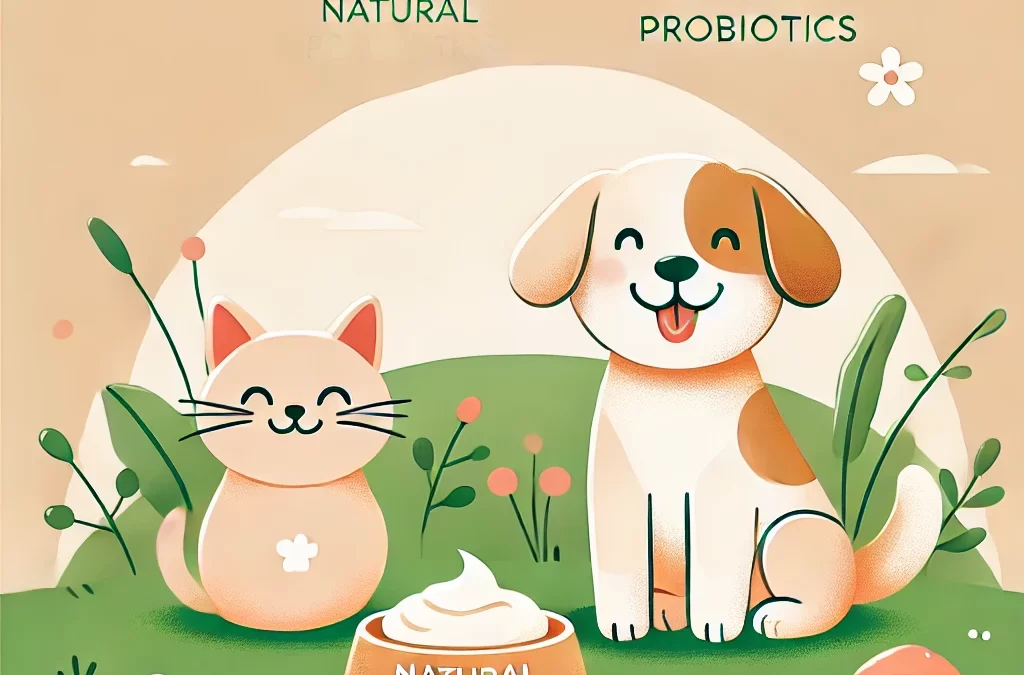Tout comme les humains, les animaux de compagnie peuvent grandement bénéficier des probiotiques, ces « bonnes bactéries » qui favorisent la santé intestinale, l’immunité et le bien-être général. Si les probiotiques commerciaux sont populaires, les sources naturelles de probiotiques émergent comme une approche efficace et holistique. Cet article explique ce que sont les probiotiques naturels, où les trouver et comment ils peuvent améliorer naturellement la santé de votre animal.
1. Que sont les probiotiques naturels pour animaux de compagnie ?
- Définition:Les probiotiques naturels sont des bactéries bénéfiques vivantes présentes dans les aliments, les herbes et les plantes naturellement fermentés.
- Comment ils fonctionnent:Ces micro-organismes aident à équilibrer le microbiome intestinal, à améliorer la digestion, à renforcer la réponse immunitaire et peuvent même avoir un impact positif sur l’humeur.
- Différence avec les probiotiques commerciaux:Les probiotiques naturels proviennent d’aliments entiers et sont moins transformés, offrant une solution plus proche de la nature.
2. Avantages des probiotiques naturels pour les animaux de compagnie :
- Une meilleure digestion:Les probiotiques peuvent aider à décomposer les aliments, à absorber les nutriments et à réduire les problèmes digestifs comme les gaz ou la diarrhée.
- Une immunité renforcée:Un microbiome intestinal équilibré renforce le système immunitaire, aidant les animaux de compagnie à combattre plus efficacement les infections.
- Soulagement des allergies:La consommation régulière de probiotiques peut soulager les allergies cutanées en réduisant l’inflammation dans l’intestin, où naissent de nombreuses réponses immunitaires.
- Humeur et comportement:Les recherches montrent un lien entre la santé intestinale et l’humeur, suggérant que les probiotiques peuvent avoir un effet calmant sur les animaux de compagnie.
3. Sources de probiotiques naturels pour animaux de compagnie :
- Yaourt et Kéfir:Le yaourt nature non sucré et le kéfir sont riches en probiotiques comme Lactobacillus acidophilus et Bifidobactérie. Ceux-ci peuvent favoriser la santé digestive s’ils sont administrés en petites quantités sans danger.
- Légumes fermentés:De petites quantités de légumes fermentés comme la choucroute (non salée) peuvent offrir des probiotiques, mais ceux-ci doivent être introduits avec prudence.
- Vinaigre de cidre de pomme:Le vinaigre de cidre de pomme brut contient des enzymes et des bactéries bénéfiques, mais il doit être dilué avant utilisation pour éviter les troubles digestifs.
- Herbes et organismes vivant dans le sol:Certaines herbes comme la racine de pissenlit et la racine de chicorée contiennent des prébiotiques, qui nourrissent les bactéries bénéfiques. De plus, les probiotiques d'origine terrestre présents dans les sols biologiques sans danger pour les animaux peuvent naturellement favoriser la santé intestinale.
4. Comment introduire des probiotiques naturels dans l'alimentation de votre animal
- Commencer petit:Introduisez de petites quantités et surveillez tout trouble digestif ou réaction.
- Observer et ajuster:Si votre animal semble en bénéficier, augmentez progressivement la fréquence ou la quantité selon les conseils d'un vétérinaire.
- La cohérence est la clé:Des doses régulières et constantes de probiotiques naturels ont tendance à donner les meilleurs résultats, alors trouvez une méthode adaptée à la routine quotidienne de votre animal.
5. Quand envisager les probiotiques naturels plutôt que les compléments alimentaires
- Pour les animaux sensibles:Les animaux domestiques qui ne tolèrent pas bien les suppléments probiotiques commerciaux pourraient mieux réagir aux sources naturelles.
- Traitement post-antibiotique:Après une série d’antibiotiques, les probiotiques naturels peuvent aider à restaurer le microbiome intestinal.
- Entretien quotidien de la santé:Si vous recherchez une approche préventive, les probiotiques naturels peuvent être une option douce et efficace pour la santé quotidienne.
6. Conseils de sécurité et éléments à surveiller
- Évitez les additifs: Optez pour des sources probiotiques simples, sans saveur et sans sucre, car les additifs comme le sucre et les arômes artificiels peuvent nuire aux animaux de compagnie.
- Consult Your Vet:Vérifiez toujours auprès de votre vétérinaire, surtout si votre animal souffre de problèmes de santé sous-jacents ou d’allergies.
- Surveiller les effets secondaires:Dans de rares cas, les animaux domestiques peuvent souffrir d’une légère diarrhée ou de ballonnements pendant que leur système s’adapte aux nouveaux probiotiques.
Conclusion :
Les probiotiques naturels offrent une solution holistique pour améliorer la santé de votre animal de compagnie, en favorisant la digestion, l'immunité et même l'humeur. En introduisant des sources sûres et naturelles de probiotiques, vous offrez un chemin plus naturel vers le bien-être. Avec de la patience et de la cohérence, ces aides naturelles peuvent devenir un élément essentiel de la routine de votre animal pour une vie plus heureuse et plus saine.















